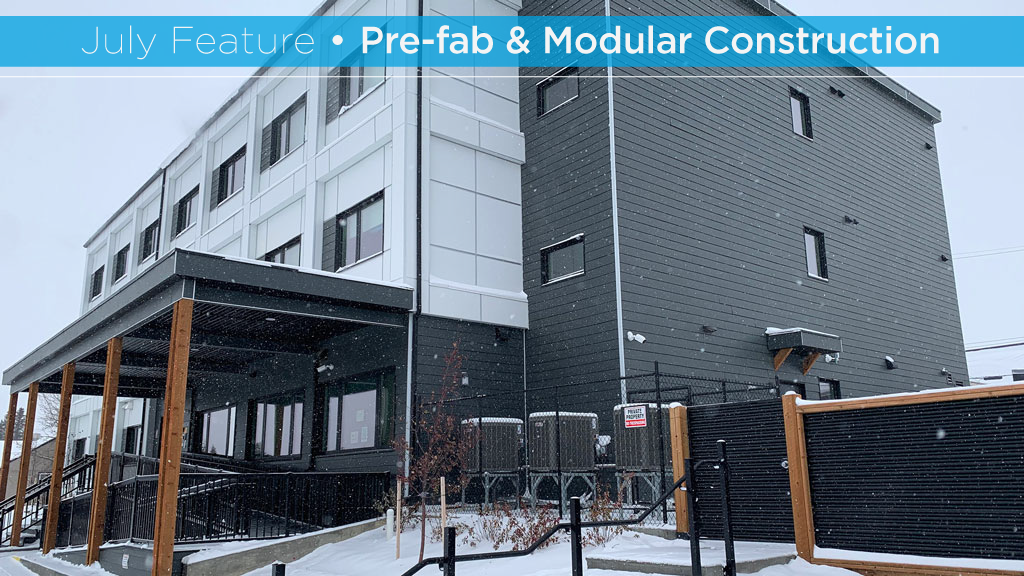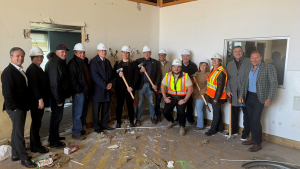Multi-unit housing is one of the fastest growing areas of modular construction across the country.
Kevin Read, CEO at Nomodic in Calgary, Alta. and chair of the Modular Building Institute (MBI) Canadian council, says this is an area of great opportunity.
Nomodic’s 2,272-square-metre supportive housing project in Chilliwack, B.C. was completed start to finish in 299 days for Grandeur Housing, which was contracted by the province under the Building BC: Rapid Response to Homelessness program.
That program aims to invest $291 million to build 2,000 homes and a further $170 million over three years for 24/7 staffing and support services.
The Trethewey Avenue project has 11 modules for each of three storeys for a total of 33 modules. These were frameless wood structures with three eight-foot-by-47-foot units and the rest 12-feet-by-60-feet. In total it yielded 46 self-contained suites – five designed for people with disabilities, at about 350-square-feet and including a bathroom, kitchenette and bedroom/living space.
The first storey houses office space, tenant support rooms, a commercial kitchen with pantry, a common dining room, heat treatment room, storage and laundry facilities.
There’s a common corridor down the middle to maximize space and achieve the greatest number of tenant suites within the footprint.
The exterior features Hardie Panels, Alucobond panels and HF-12 panels.
The working parts are also innovative with all suite HVACs completed at the Winkler, Man. module factory.
The excavation, underground utilities and foundation were complete in parallel with the modules being fabricated. Some 80 per cent of the building’s electrical, plumbing, sprinklers, HVAC and carpentry were installed at the factory where labour rates were contained and there was no shortage of workers.
The build won an MBI award.
NRB Modular Solutions, based in Calgary, also scooped up an award for their Dawson Creek supportive housing project in British Columbia.
It’s 19,410 square feet and took just 273 days to complete the three-storey structure with 32 self-contained studio homes, including two accessible units.
Designed as a solution to homelessness, each home has a kitchenette and washroom with communal laundry room, as well as dining rooms and a commercial kitchen.
Andy Berube, vice-president of sales for Canada/USA at NRB Modular Solutions, says while the Dawson Creek project was about affordable housing, it actually won first place in the Green Build category.
“Green is one of the great impetuses of what we’re doing,” he says, noting the project exceeded the BC Energy Step Code incorporating passive design principles to minimize the heating loads.
The design team also increased overall performance through sustainable construction materials and improved energy efficiency.
Affordable housing and rapid build multi-unit structures are also top of the list in what is driving interest and he also points to the B.C. Build program for opening doors to more modular.
Dawson Creek was one of five projects that were singled out for awards, he says.
Another NRB Modular Solutions winning project was a pair of 3,200-square-foot structures each with five units in Oshawa, Ont.
It took just 180 days to complete and was installed on some surplus land owned by Durham Region.
It was needed quickly to provide shelter and support for the chronic homeless challenge in that city and is part of a series of micro-housing being built and partially funded by the Canadian government’s Rapid Housing Initiative.
NRB designed and built the suites with their own kitchen, washroom and sleeping space and exceeded the National Energy Code of 2015 by 25 per cent.
Both structures were also designed to be re-locatable with a temporary block and pad foundation. Both the builds and the foundations can be repurposed when the land itself is reallocated.
“I’ve been doing this for over a decade, slowly growing, and in the last five years it’s just been on a rise,” he says.
Conventional construction isn’t going away, he stresses, “but more projects are taking advantage of advances in technology and other methods of construction under the umbrella, be it prefab panels or volumetric. What we’re selling is time and the value of time. Turning capital around quicker, getting to revenue quicker, less site disruption.”
Modular isn’t cheaper but it’s cost competitive, he says, when you add up the value of time from start to finish with the added bonus that the community often has to suffer through less disruption during the process compared to an onsite project.
“Compared to onsite, you’re able to shave off six to seven months,” he says.
However, he cautions, modular isn’t appropriate for every project and requires complex logistical planning to get the units from the factory to the site.
“Nothing in construction is simple,” he says. “You need a good general contractor who understands the sector, to manage the variables and the risk and a good modular team.”




Recent Comments
comments for this post are closed